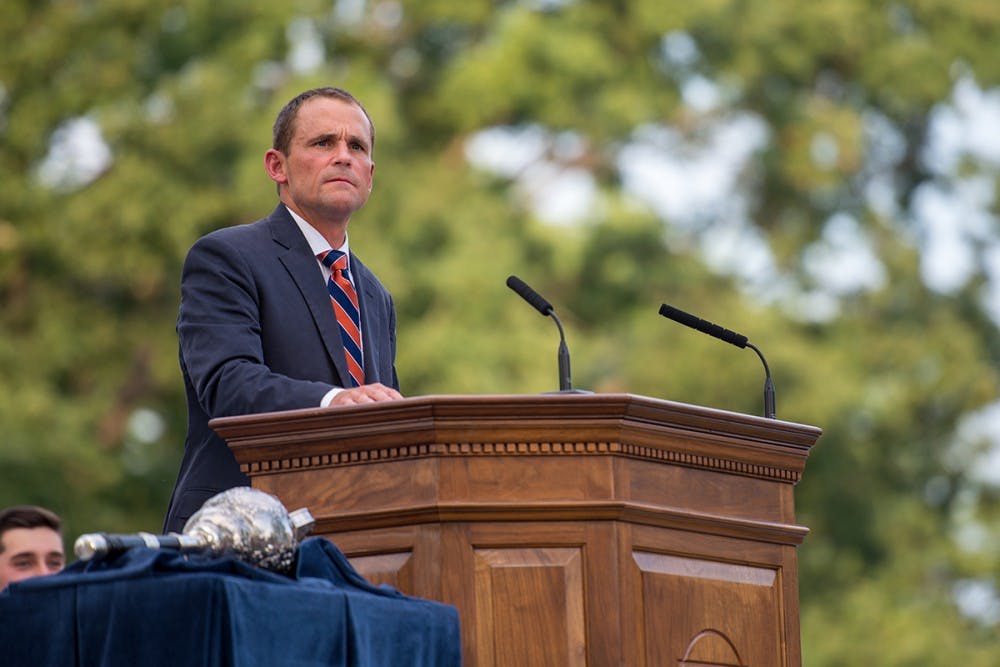When University President Jim Ryan describes his vision for his tenure as the University’s ninth president, he focused on three areas he wanted to address: community, discovery and service. While these areas should be included in his list of priorities — and remain essential topics for any administration — the president and the rest of the University administration should focus on addressing other challenges facing the University and higher education as a whole. These challenges include ensuring higher education is accessible to students from a diverse array of backgrounds and preserving free speech and discourse on Grounds.
First, over the past several years, higher education has become increasingly difficult to obtain for many Americans because the cost of college has consistently risen over the past several decades. For the 2018-19 academic year, the estimated cost of attendance for in-state undergraduate students at the University totals $32,432 and up to $65,256 for out-of-state students. While the University reviews applications need-blind and meets demonstrated need, the cost for many Virginia families — even with in-state tuition privileges — remains burdensome. In order to best serve the Commonwealth, making a University education accessible to Virginia families must remain their primary priority, and President Ryan should work with the rest of the administration to appropriate more funds towards tuition relief. The $2.2 billion that the Board of Visitors set aside for strategic investments could largely fund such relief.
The University should also reform admissions policies to make itself more accessible. In order to remove barriers to higher education that lower-income students often face, the University of Chicago implemented a test-optional admissions policy. Students of lower socioeconomic status often do not perform as well on standardized tests as their richer counterparts, and eliminating the barrier that tests like the SAT and ACT pose to prospective students helps make the admissions process fairer for all applicants. The University administration should similarly adopt a test-optional policy to make its education and community more accessible to lower-income students.
Additionally, the University should expand outreach efforts to underrepresented parts of the state. According to the Class of 2020 admissions profile for in-state students, 676 students come from Fairfax County alone. Loudoun County accounts for 252 enrolling students, and 129 students come from Prince William County. Meanwhile, many counties in Southwestern Virginia, Southern Virginia, and Tidewater have very little or no representation at the University. As an institution dedicated to the service of the entire Commonwealth of Virginia, the University should increase its presence in recruiting from the entirety of the state. Students from rural areas are underrepresented at colleges across the country, and financial barriers contribute towards the inaccessibility of college for these communities. The University — as a public institution with significant financial aid resources — is in a position in which it can remove barriers that often prevent rural Virginian students from attending college.
Secondly, the president should work with the University administration to revisit recent policy changes implemented in response to white supremacist and white nationalist activity on Grounds and in Charlottesville. The University enacted a restriction to its free speech policy to prevent unaffiliated groups and individuals from gathering on grounds.
While the new policy sought to counteract the goals of alumni like Richard Spencer and Jason Kessler, who have spread division and fear both at the University and around the nation, it approached the issue from a position of weakness instead of strength by seeking to limit speech. It is essential the University not sacrifice ideals like free speech and assembly which are ingrained in its identity by its founder.
As the influence of individuals like Kessler and Spencer decline, the University should revisit its decision to restrict free speech since it is a taxpayer-supported institution. The University’s administration must approach any restrictions to speech with caution as such changes have the potential to unfairly target certain individuals and groups and erode the climate of open discourse.
There remains several challenges that the entire University community — including it students, faculty, staff, alumni and administration — must work together to address. Unfortunately, many of the answers to these challenges are not readily apparent. However, President Ryan and his administration must ensure that the entire University community contributes to solving these issues in better to best serve the students and the Commonwealth.
Thomas Ferguson is an Opinion Columnist for The Cavalier Daily. He can be reached at opinion@cavalierdaily.com.





